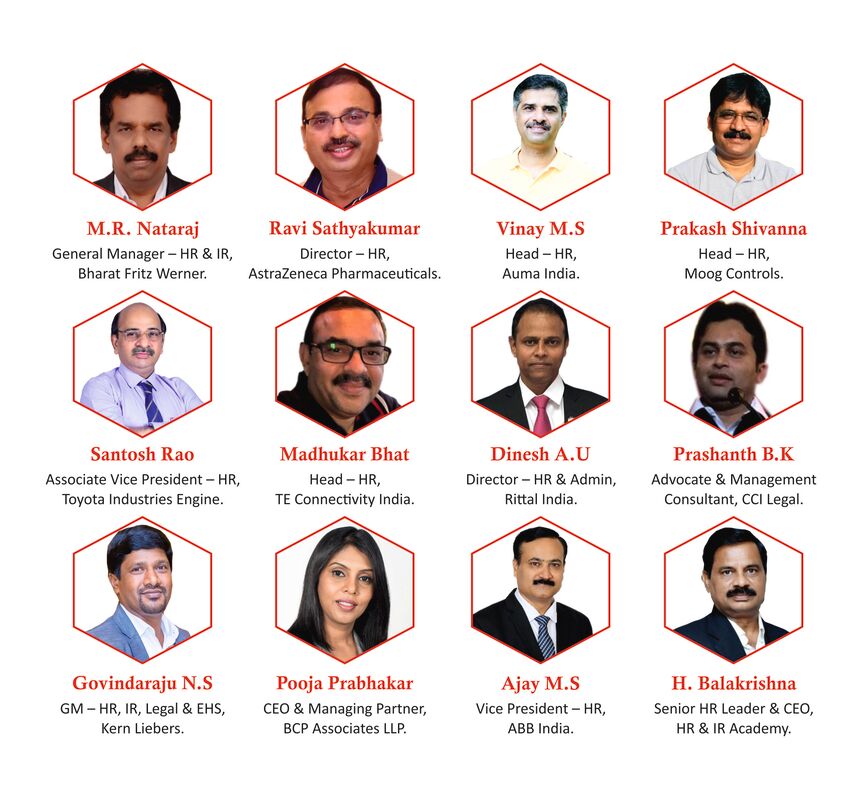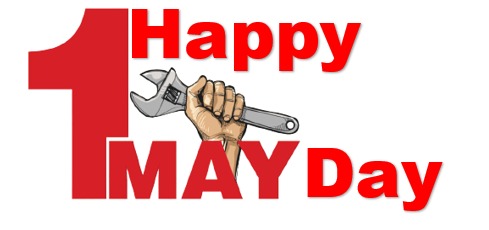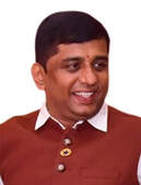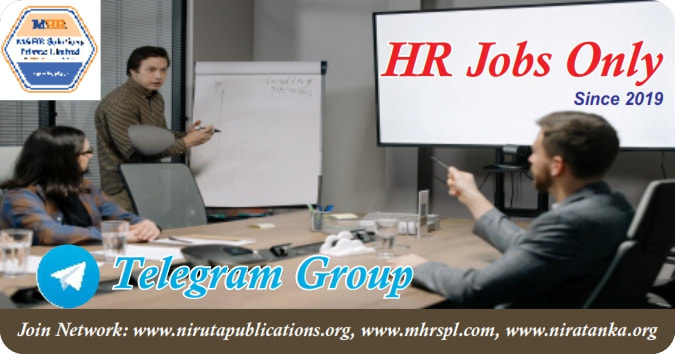LEADERS TALK - AN INITIATIVE OF NIRUTA PUBLICATIONS, SHEKHAR GANAGALURU'S INTERVIEWS WITH LEADERS4/30/2022 1. One thing that makes you passionate about HR... Nataraj: It is dynamic from the time in memory. Human responses are difficult to predict. The same scenario will have different responses from different people at different times. This zillion unpredictability is the beauty of managing human resources. Ravi: HR helps to bring out the best in human beings and turn, helps to contribute to the society with better-cultured people. Santosh: Really, I wasn't keen on making HR my profession. It's my luck, I'm in HR today. HR is a profession, which is people-centered and development-focused. In the process of developing people, HR contributes good citizens to society. Employee development means, a good employee, good son/daughter, good partner, good friend, good human being, etc. 2. What is more important, Experience or Attitude? Nataraj: Both are important. However, proven experienced candidates are expected to deliver exceptional results. In most leadership positions, qualitative experience is necessary. Ravi: Obviously, attitude. The right attitude can help you get the right experience. In the selection process, I give first priority to attitude and next to experience. 3. What do you think are the biggest challenges of your role? Vinay: Digitalizing HR systems. Business continuity during volatility. Talent management. Prakash: Talent acquisition – getting the right people to the right positions. Managing the expectations of younger generations. Generation gap conflicts between gen Y & gen Z. Illogical expectations of unionized workers. 4. The top three things HR Professionals need to succeed are… Vinay: Leading transformation, impact & influence and thinking big. Prakash: Change management & adaptability, technological & data-savvy and integrity & ethical behavior. Madhukar: Being digital savvy, inclusiveness in thoughts & actions, and ability to grasp the changing business landscape. 5. What is your leadership philosophy? / As a leader in your organization, how do you inspire your team? Madhukar: Walk the talk, build trust and be passionate about developing people. Dinesh: I trust in inclusiveness. I value the uniqueness of each person. The leader must realize that everyone has unique strengths and derive benefits from its best use to the organization. I believe in facilitating people to break the barriers and inhibition. Pooja: I lead by example and lead from the front. By clearly demonstrating and articulating what I do and why coupled with working in an open and transparent fashion, everyone in my organization has visibility into my work and efforts. This sets the tempo, and most members then naturally follow the overall ethos. 6. Some HR professionals say that HR people are given last priority when it comes to recognition and compensation, they don't have the authority and power they need, and decisions are taken by the CEO/COO/MD. What do you say about this? Govindaraju: In my view, these are the reasons for securing safe shelter and of course the outcome of incompetence. When it comes to decisions, the CEO/COO/MD is responsible and accountable for the same to ensure the progress of people and the organization. Here, the question is whether HR is treated as a business partner, consulted before making decisions and the consideration given for the inputs of HR is what matters the most. In addition, it is also important to understand the space available and set the right space for HR in the organization. HR professionals must create their brand by ensuring a great value addition and agile HR systems to manage the uncertainties of the business. HR Professionals can achieve this by obtaining strong business and human-centric competencies, only. Santosh: Business leaders like those who add value to the business and increase numbers. It is their responsibility and they are accountable for this. HR leaders need to understand this pulse and build the HR department with a business-centric approach, proactive value-added strategies, ensuring greater productivity from employees, and cost-effective HR strategies to manage business uncertainties in line with applicable rules and regulations. 7. What is your advice to young leaders? | *What advice would you give to the next generation of female leaders? Ajay: I strongly suggest the following tips:
Pooja: *My biggest message here is never to view oneself as a female or male leader. A leader is a leader and that is the bottom line. Once viewed neutrally this way, it sets one up for success no matter what the circumstances. Concentrating on the job and responsibilities at hand and setting aside all other distractions and social distortions should be the sole focus. 8. How do you help the average employee to perform better at work? Ajay: The HR Professionals must use the following guiding principle in collaboration with managers to help the average employees to perform better at their work:
9. What are your tips for HR professionals to enhance their knowledge in labour laws? | *What are your tips for young rural background HR professionals looking for suitable jobs in HR? Prashanth: Today, enough information is available in electronic form. HR professionals should ask themselves certain practical questions whenever they do certain HR/IR activities and find out the answer on their own. For example, regarding EPF – HR professionals should study themselves as to what is Basic Wages, who is an Employee, how EPF Authority functions, etc. I advise young aspiring HR professionals to spend half an hour per day for knowledge enhancement on a specific subject with continuity – it may be reading, participating in professional discussions within the teams, attending seminars, etc. Balakrishna: In the recent past, I noticed many young HR Managers prefer to settle only in HR, but not in IR since they lack in handling industrial relations and do not have sufficient knowledge of labour laws. Lack of labour laws knowledge leads to non-compliance and the same will affect negatively the reputation of a company. Hence, the knowledge of labour laws is a key requirement for HR Professionals. HR Professionals must monitor legal changes and adapt company policies and procedures accordingly. They must develop the reading habit of labour law journals, books, and case laws. Attend the training sessions on labour laws and interact with senior professionals. Dinesh: *Identify your weakness and work on it. You are the key to your success. Nothing can replace hard work and loyalty. The sky is the limit; strive to create your own space. Keep a strong belief in your strengths. Convert knowledge into wisdom. Work on communication, presentation, and corporate etiquette. Develop strong technical and data orientation. Commit sincerely to ongoing learning. Have an ethical approach and develop networking ability. 10. “New Labour Codes – Ease of doing business.” Do you think this will come true in reality? | *Despite the positive aspects, we see employers and employees agitating against Labour Codes. What is your opinion on this? Prashanth: No. I wish the Government would not notify these Labour Codes in the current form. Though some of the provisions in these labour codes are well thought of, there are many provisions, which are vague and suffer from non-application of mind. *Govindaraju: It is true that there are few provisions that may not favour positively for employers and a few for employees. But this should not hinder the implementation of the Labour Codes because 'a right of a person is an obligation of another.' Moreover, the expectations of parties are opposite of each other most of the time. As long as two opposite parties are involved, one party 6 is another party 9 and both are right & both are wrong in different perspectives. As time progress, the law will fit its own and gets matured by the interpretations of Courts and also amendments to the provisions. Therefore, we have to appreciate the objective behind the codification and accept the change. 11. What methods/strategies can help improve good industrial relations in the Company? Balakrishna: In my opinion, the following are the strategies and best practices for improving employee relations at the workplace:
20,000 HR PROFESSIONALS ARE CONNECTED THROUGH OUR NIRATHANKA HR GROUPS.
YOU CAN ALSO JOIN AND PARTICIPATE IN OUR GROUP DISCUSSIONS
2 Comments
Sai Chaitanya
5/21/2022 12:24:03 am
Inspiration for HR
Reply
Shankarmurthy L
5/24/2022 04:45:01 am
Great Leaders, very much impressed by everyone
Reply
Leave a Reply. |
Categories
All
50,000 HR PROFESSIONALS ARE CONNECTED THROUGH OUR NIRATHANKA HR GROUPS.
YOU CAN ALSO JOIN AND PARTICIPATE IN OUR GROUP DISCUSSIONS. |
||||||||||
SITE MAP
SiteTRAININGJOB |
HR SERVICESOTHER SERVICESnIRATHANKA CITIZENS CONNECT |
NIRATHANKAPOSHOUR OTHER WEBSITESSubscribe |
MHR LEARNING ACADEMY
YOU CAN ALSO JOIN AND PARTICIPATE IN OUR GROUP DISCUSSIONS.
|
|








 RSS Feed
RSS Feed





